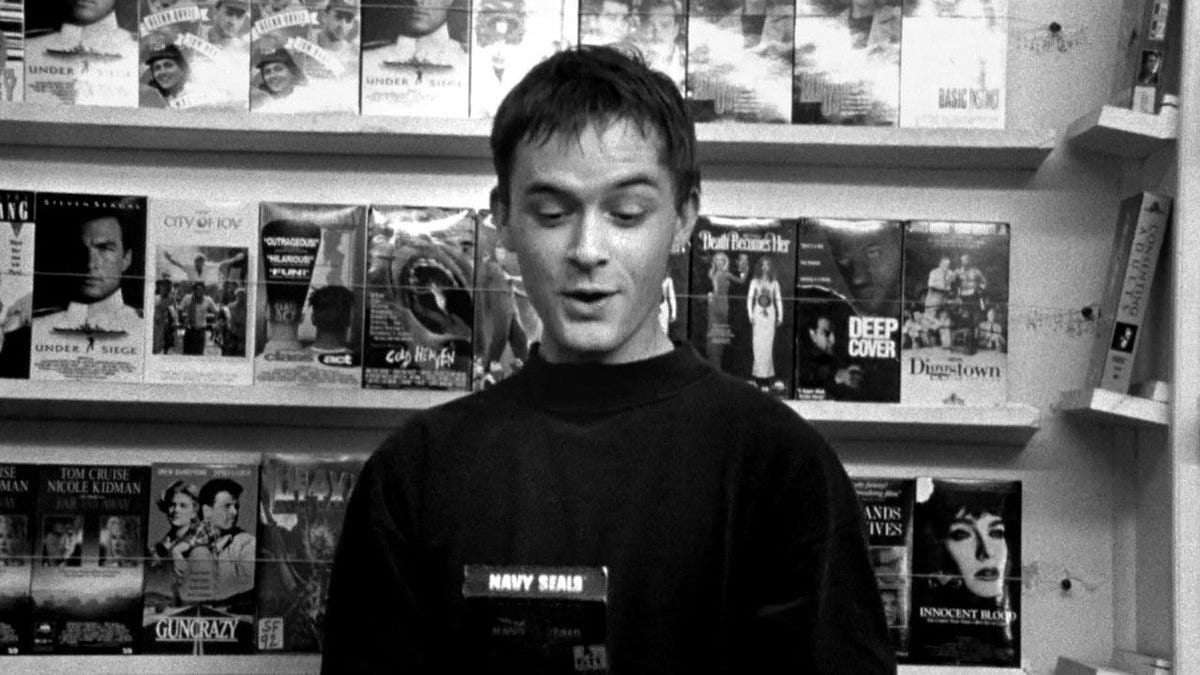Customers Have a Say in What Gets Made Too
Plus: A ‘Blood’y assignment!

Harper’s this week published a lengthy reported feature about the state of Hollywood, particularly the state of screenwriting and whether or not folks can credibly make a living while doing so. It’s kind of interesting in the sense that the author has an idea (deregulation is bad and greedy CEOs are ruining everything) and writes backward from there. I am … skeptical that Ronald Reagan is the proximate cause for the streaming bubble popping, but, you know, maybe. You should give it a read and decide for yourself.
Ultimately, that’s what we’re dealing with: a bubble. An insane amount of money was poured into the production of an enormous number of scripted television series—633 seasons were released in 2021 and 2022, by one measure, a number that dropped by nearly a quarter last year—and that bubble is rapidly deflating as streamers turn their focus from subscriber-acquisition to profit-making and start to acknowledge that spending enormous gobs of money on stuff that almost no one actually watched was a real mistake. Fewer shows being produced means fewer writers will be hired and competition for the remaining slots will likely be tighter, driving salaries down further.
What was most intriguing about the Harper’s piece was what was missing. At first, I thought I’d accidentally skipped over a section. But then I did a command-F and realized, no, I was right. There’s no mention, at all, of the pandemic. Or of Covid. Or of lockdowns. Or the resultant boom in streaming content as studios rushed to sate the desires of audiences stuck at home. Or the resultant theatrical crash as local and state governments kept theaters closed in New York and California, crushing the ability to distribute films domestically and putting the entire theatrical economic ecosystem at risk.
Audiences were already turning to streaming, for sure—note the rapid decline in DVD and Blu-ray sales in this post’s chart titled “U.S. Home Entertainment Market by Category” that begins in 2008, right around the same time Netflix introduced streaming—but the lockdowns undoubtedly hastened the process. Every studio decided at the same time they needed to build up a subscriber base NOW NOW NOW, and they were happy to pay handsomely to do it. How do we know they paid handsomely? Well, the screenwriters were putting up what appeared to be record-breaking numbers, as best as we can tell from WGA dues collected in 2023.
Speaking of the collapse of physical media, this is another key factor in the evolution of the business of Hollywood that gets short shrift in the feature. I don’t think you can fully understand the hard turn to IP and the reliance on foreign box office grosses in the form of big-budget spectacle without grappling with the collapse of DVD and home video alongside the increase in advertising costs that accompany every movie opening on 2,500 or more screens. It’s harder to recoup the cost of a mid-budget movie if you don’t have an extra eight figures of disc revenue coming in for every movie with Matt Damon in a courtroom on the cover. As much as it pains me to say this as a physical media die-hard, most folks are content not owning anything so long as they think they can stream it whenever they want. Customer behavior matters.
Plus, audiences liked the franchise boom. Ten of the 20 highest-grossing films of all time, domestically (unadjusted for inflation), are either comic book or Star Wars movies. Add in other sundry franchise sequels and that number climbs to 14 of 20. Throw in live-action remakes of cartoons and movies based on long-running children’s properties like Barbie and Super Mario Bros., and that number climbs to 18 of 20. By my count, there are precisely two truly original films in the 20 highest-grossing films of all time, and James Cameron directed both of them: Titanic and Avatar.
So, sure, deregulation played some role in the current state of screenwriting, though some measure of contraction was likely always coming as creating dozens of TV shows that no one watched on services that lost money was not sustainable indefinitely. But let’s give audience preferences some measure of the credit/blame here, too, shall we?
Links!
This week I reviewed The Ministry of Ungentlemanly Warfare, the latest from Guy Ritchie who has now cranked out five movies over the last four years. You love to see it, folks.
I hope you enjoyed Across the Movie Aisle Live; we love doing these shows and would love to do more. Hopefully, the interest is there!
I don’t do a lot of sports talk here, but one thing I’ve been fascinated by is the proliferation of gambling as a source of revenue for both the leagues and the TV networks, and how it’s going to wind up totally destroying the game because it destroys the integrity of the players.
Participant—the label behind Spotlight, Roma, and other award-winning indie-type productions—is shutting down operations.
Loved this piece by Alan Zilberman on the joys of watching Washington, D.C., get blown up real good on film.
Last week, I wrote about streaming channels like Criterion turning to linear-like channels in an effort to entice viewers to stay longer on the apps; this week, Disney announced they’re unveiling linear-like channels in an effort to entice viewers to stay longer on their app. Read me, get tomorrow’s news today!
Assigned Viewing: ‘Blood for Dust’ (Video on Demand)
On last week’s episode of The Bulwark Goes to Hollywood, I talked to Blood for Dust director Rod Blackhurst about, well, a bunch of stuff, from his early Funny or Die shorts to making a horror short in the hopes of turning it into a horror feature to his documentary about Amanda Knox that Netflix wound up picking up. But the reason we were chatting was his forthcoming film, Blood for Dust, which is on VOD today.
What jumped out to me about Blood for Dust was the specificity of the world within which it was set. Scoot McNairy plays Cliff, a traveling salesman whose focus on moving portable defibrillators is both strikingly precise and understandably universal: he’s worried about keeping a roof over his head and getting treatments for his sick kid, but it’s all a function of making sales, getting percentages, etc. It’s a world that’s both foreign and relatable, one lived by lots of folks who I am not but I could be. Guys right on the edge of making it and not.
Cliff slips off the edge after his boss finds out about some shady stuff he got up to on his last job, and an iffy economy combined with the whisper campaigns soon has him sleeping in his car. In walks Ricky (Kit Harrington), a former coworker involved in the aforementioned shadiness who has an opportunity for Cliff: help him run drugs through the northern states for a local kingpin. A combination of desperation, bad decision-making, and comfort with life on the road render him a logical fit, and we’re off: what follows is a twisty, western neo-noir filled with double-crosses and shootouts and high-stakes mistakes.
What I really loved about Blood for Dust, however, is the dynamite cast. Scoot McNairy is a classic character actor, one of those guys who seems to show up in everything and always makes an impact thanks to his soulful eyes and clipped speech. It takes a heck of an actor to hold his own with Leonardo DiCaprio and Timothy Olyphant, as he did in his brief turn as “Businessman” Bob Gilbert in Once Upon a Time in Hollywood; I loved his work in Batman vs. Superman: Dawn of Justice as an embittered employee of WayneCorp and his scene as one of Amy Dunne’s victimized lovers in Gone Girl. McNairy’s an A-list scene stealer, a guy you call in for spot work on your blockbuster, but if you haven’t seen Monsters, Gareth Edwards’s debut feature, you really should: he’s the lead, and he’s great, and you can understand why Edwards went on to make Godzilla and Rogue One on the strength of this picture.
Joining McNairy is Kit Harrington, most famously of Game of Thrones, and I have to confess: I’ve never really loved Harrington as an actor. Yes, he was fine in Game of Thrones as the bastard son of Ned Stark, but frequently overshadowed by the rest of the cast and his other work was not particularly impressive. However, he’s something of a revelation here, projecting a perfect scumbag outlaw vibe: a little too ballsy and not quite bright enough to have thought through all the implications of his plans.
The supporting cast is just so much fun to watch. I mean, this is a movie where Stephen Dorff rolls in for one scene, crushes it while seated behind a desk the whole time, and rolls out. Josh Lucas—who has been amusing the heck out of me as the rich dilettante on AppleTV+’s Palm Royale the last few weeks—is similarly great, oozing a sort of deranged menace as a vicious drug dealer. And Ethan Suplee … what can I say about him? I’ve loved Suplee’s work since Mallrats, a formative film in my wayward youth, and he always impresses. I rewatched The Hunt recently and his manic conspiracy theorist podcaster never fails to crack me up, and he made a great heavy in both Babylon and God Is a Bullet.
Blood for Dust is one of those mythical movies for adults: they still exist, you just need to know where to look for them. If you’re planning to make it a night in and are looking for something a little different, do yourself a favor and check it out.






Great piece Sonny. About that comment re your opinion on sports…Although maybe not in the Bulwark’s list of things to do this election year, I for one would read a sports column. Your podcast and columns help me remember the before-times and are an indulgence and pleasure to consume each week. Whenever I’m driving with my son (12) he will invariably take over the car stereo and play the pod, and I don’t think we’ve missed any (!). It’s a moment with his dad when I’m not thinking about work or the dismantling of the rules-based world that continues apace - you provide a rich, nutritious conversation between you and Alyssa and Peter that my kid and I have turned into a weekly ritual. It springboards me into a place of needed repose. And if you put out a piece of sports content you’d probably have two more solid consumers. Just saying. Thanks for all you guys do, enjoy your weekend!
We still want to own the media - we buy plenty of disks ... stuff disappears from streaming. But I guess we're in the minority. (Recently got "After Hours" based on your recommendation, by the way - what a trippy movie!)